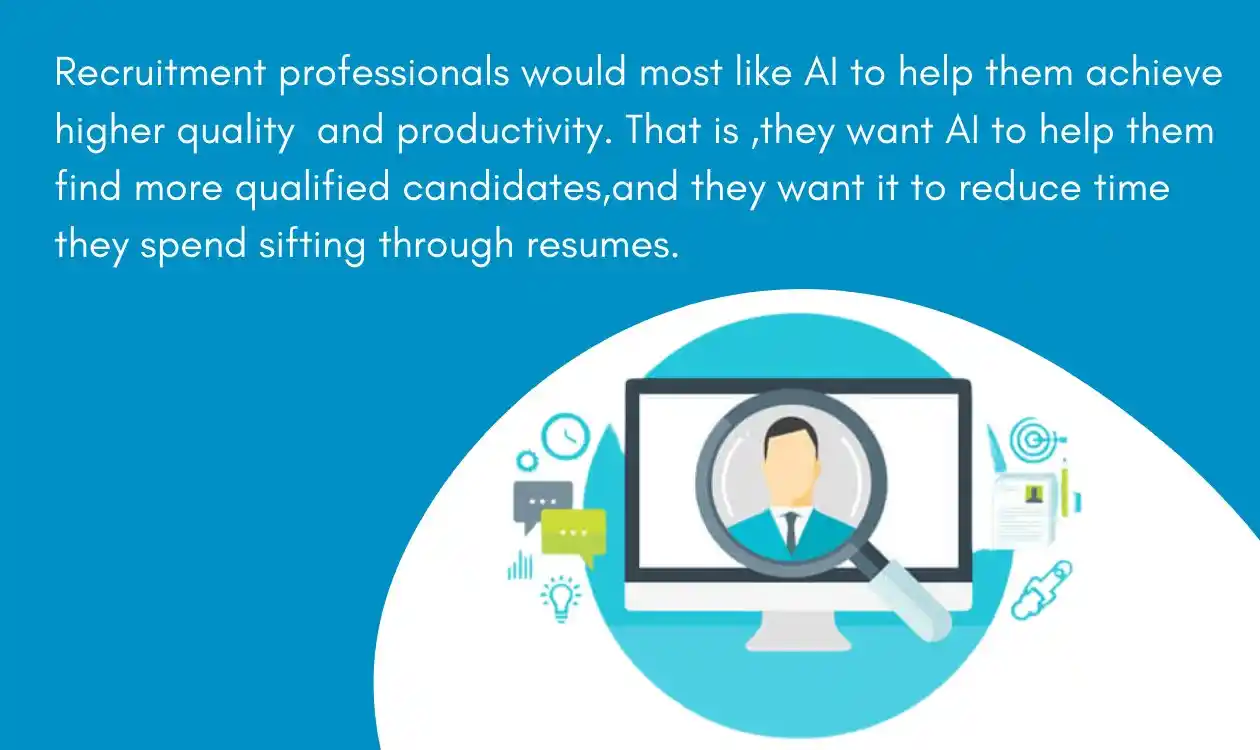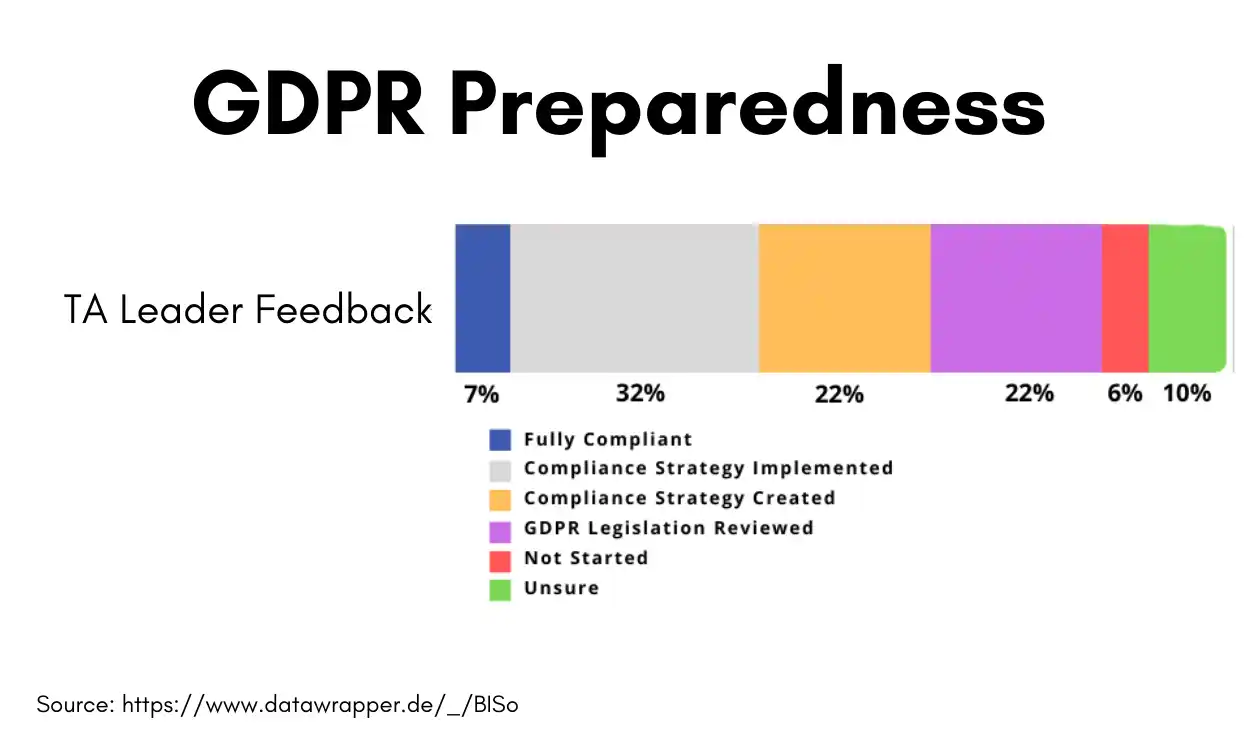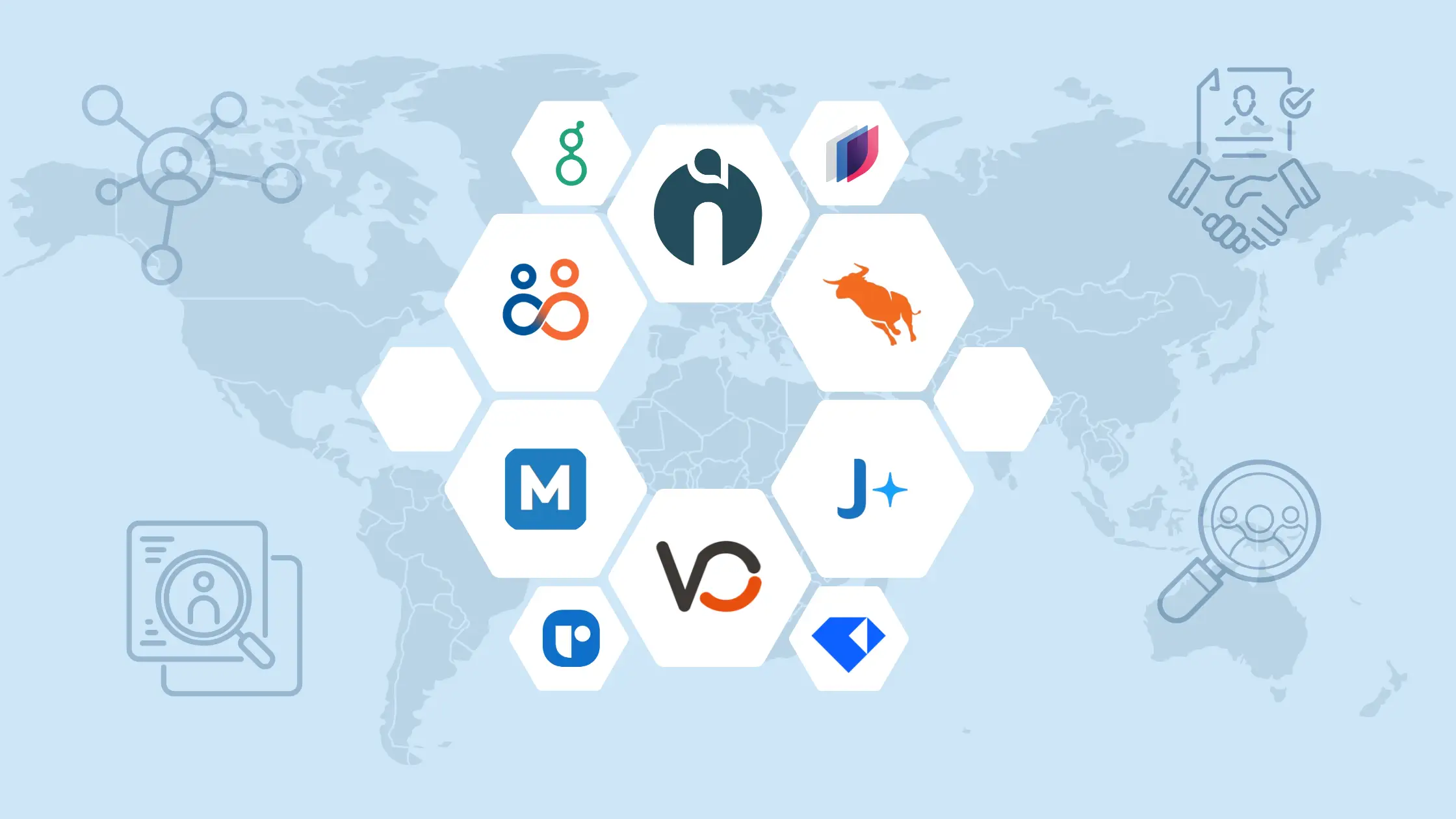Are you a hiring professional who struggles to streamline and manage your entire recruitment process efficiently? Then, get ready to discover the perfect solution to overcome all your recruitment hurdles.
Introducing Applicant Tracking System (ATS), your gateway to quickly discover, attract and hire the brightest minds in the job market.
Now, you must be wondering why ATS has recently become the talk of the town in the recruitment landscape.
How will ATS solve all your hiring problems?
Why is the importance of an ATS growing rapidly?
To solve all the doubts you have, we conducted deep research and prepared a comprehensive solution guide on the Applicant Tracking System.
In this guide, you will get everything you need to know before buying an ATS. So, what are you waiting for? Let’s streamline your end-to-end hiring by diving deep into the sea of knowledge that enables you to get the maximum out of using ATS.
What is an Applicant Tracking System (ATS)?
Applicant Tracking System is a recruitment software application used by recruitment professionals and staffing agencies to streamline and manage the end-to-end hiring processes and workflows.
Basically, ATS software serves as a digital tool for collecting, organising, and tracking job applications and candidate information. It is also known as the Candidate Tracking System.
Imagine the ATS System as a digital gatekeeper that helps you source, attract, assess, and onboard the best talent to fill your organisation's open positions.
How Has the ATS Evolved Over Time?
Traditional Recruitment: Before the digital era, recruitment was mainly dependent on paper-based resumes and manual record-keeping, which was incredibly time-consuming.
Shift to Digital Databases: Recruitment professionals move toward online databases to save candidate data after the invention of the computers.
ATS System in 1990: This revolution of first-generation ATS software enables recruiters to store, search, and manage resumes more efficiently.
Web-Based ATS: The ATS platform became popular in the early 2000s as it enhanced accessibility, collaboration, and scalability, and recruiters and HRs can access it from any location with an internet connection.
ATS Integration with Job Boards: Slowly, online job boards and career websites became mainstream. ATS Integration with these online platforms enabled seamless job posting and candidate application processing.
Advanced Search and Matching: Modern-time ATS systems include advanced features to parse and match resumes to open jobs based on keywords, skills, and other important criteria, streamlining the candidate selection process.
Mobile-friendly ATS: ATS platforms are adapted to provide mobile-accessible interfaces, which make it easier for recruitment professionals to access and manage candidate data on the go.
How Does Applicant Tracking Systems Work?
ATS systems are designed to help recruiters and HRs to manage recruitment from start to finish. Let’s understand how ATS software streamlines and automates recruitment workflow.
Here is a step-by-step infographic of ATS functions.
_(1).webp.dat)
Easy Job Posting
Recruiters can create job descriptions within the ATS by specifying the job title, description, requirements, and other key details. Once it is done, it facilitates the automatic posting of job openings on various job boards, career websites, and social media platforms with just a single click.
Application Submission
Candidates apply for open jobs by submitting their resumes and applications through the ATS interface or the company's career portal. The ATS then stores these submissions in the candidate database.
Filtering Resumes
Once a candidate submits a resume or application online, the ATS parses and extracts key information such as contact details, work experience, education, skills, and other qualifications. This process is done using algorithms and natural language processing (NLP) to create an organised online profile for each candidate.
Knockout Screening
ATS automatically filters out candidates who do not meet predefined essential criteria, such as specific qualifications, experience, or skills.
By using this feature, recruiters can set questions often checkboxes or short answers, that help eliminate any candidate who is not a right fit. If an applicant doesn’t meet your organisation’s standards, then their resume is automatically set aside.
This way, you can efficiently narrow down the talent pool to those who are most likely to be a good fit for the role.
Store in the Database
The parsed candidate data is then stored in a candidate database, which is a searchable repository of applicants. It makes it easy for recruiters and hiring managers to access and manage candidate information efficiently.
Scheduling Interviews
ATS platform integrates with calendars to schedule interviews and send invitation links to both candidates and hiring managers. This is how the software allows recruiters to coordinate interview times.
Applicant Tracking
Tracking the journey of every candidate becomes a piece of cake with ATS in your tech stack. From initial application to final hiring decision, it tracks the progress of each candidate through the visual hiring pipeline. This tracking makes sure that no candidate falls through the cracks and helps TA teams stay organised.
Manage Candidate Communication
Applicant tracking systems streamline effective communication between recruiters and candidates. At different stages of the process, recruiters can send automated emails, updates, and interview invitations. It ensures that candidates stay informed and engaged.
Enable Smooth Team Collaboration
ATS recruiting software enables multiple team members to collaborate smoothly during the hiring process. Recruiters, hiring managers, and other stakeholders can review candidate profiles, leave their feedback, and make informed decisions within the ATS interface.
Compliance Management
ATS software includes features to assist with compliance. By managing documents like offer letters and consent forms, the software aligns with legal requirements in the hiring process.
Top 10 Crucial Features in ATS Software You Must Need
Well Applicant Tracking System (ATS) software is a vital tool for HR professionals and recruiters. So, while selecting ATS software, it is very important to ensure that it includes key features that streamline the hiring process.
Here’s a list of the most important technical and non-technical features:
1. Advanced Database Search Capabilities
- Searching complex queries for candidates will get easier using multiple parameters such as skills, experience, and location.
- It offers a full-text search for a complete scan of resumes and cover letters.
- It allows you to create custom filters for specific recruitment needs.
2. Customisable Workflow
- This feature allows you to create custom workflows and recruitment stages to fit your unique hiring needs.
- You can add, remove and modify the workflow steps (For instance: screening, interviewing, onboarding).
- Create custom templates for emails, assessment forms, and job postings.
3. AI Candidate and Job Matching
- This feature utilises AI algorithms to match candidates with job openings and jobs against candidates based on skills, experience, and other relevant criteria.
- The AI profile and job matching feature analyses job descriptions and candidate profiles to identify the best matches.
- Get a ranked list of candidates for each job opening and save time for your team in candidate screening.
4. Recruitment Marketing
- This feature helps you strengthen your employer branding via customisable career site integration and one-click job posting functions.
- You can target specific talent pools using tailored marketing campaigns and social media recruitment strategies.
- Leverage email marketing functionalities to nurture relationships with potential candidates.
- Also, get insightful analytics to understand the effectiveness of different recruitment marketing strategies.
- By using this feature, you can engage passive candidates by creating a talent community and keeping them informed about relevant opportunities in your organisation.
5. End-to-end Interview Management
- Integrate with calendars (such as Google Calendar or Outlook) and schedule interviews by coordinating available times between candidates and interviewers. This way, you can prevent scheduling conflicts.
- This feature allows easy rescheduling and cancellation with automatic notification updates to relevant parties.
- It comes with a functionality to create and manage interview agendas and checklists to ensure structured and effective interviews.
- The integration with video conferencing platforms supports virtual interview setup.
6. Collaboration Tools
- The team collaboration feature facilitates real-time communication and collaboration between hiring managers and recruitment team members.
- It provides shared platforms for reviewing and commenting on candidate profiles, ensuring a unified team assessment.
- Hiring managers can easily delegate and track the tasks of their recruitment team.
- The feature offers shared calendars and scheduling tools to coordinate interviews and meetings efficiently.
- You can share, edit, and streamline the creation of job descriptions and interview scripts.
7. Reporting and Analytics
- Create real-time recruitment analytics reports on different aspects of your recruitment process, such as time-to-hire, quality-of-hire and cost-per-hire).
- Leverage customisable dashboards to track Key Performance Indicators (Recruitment KPIs) relevant to your hiring process.
- Get practical insights into candidate demographics which will help you understand the diversity of the applicant pool you created.
- This feature provides more advanced functionality like predictive analytics to understand your future hiring needs by analysing historical data analysis.
8. Visual Recruitment Pipeline
- It offers a dynamic, visual representation of the recruitment process and maps out each stage from application to hire.
- This way, your recruiters and hiring managers can quickly see where candidates are in the hiring pipeline.
- You can even enable drag-and-drop functionality for moving candidates between different stages and make updates more efficient.
- Glance at the health of the pipeline, such as how many candidates are at which stage and what the bottlenecks are in the process.
- As a result, you can identify high-potential candidates and prioritise tasks.
9. Integration Capabilities
- Seamless integration of an ATS with other HR software systems like payroll, onboarding, and performance management is important for smooth data flow.
- It integrates with job boards and social media platforms to simplify job postings and attract a broader range of candidates.
- ATS will sync with email and calendar applications for efficient scheduling and smooth communication.
- This function supports the integration of advanced tools like AI-based analytics or chatbots for improved recruitment processes and candidate engagement.
10. Compatible with Mobile Devices
- You must check that ATS provides a mobile-responsive interface to ensure a seamless and user-friendly experience on smaller screens.
- It allows your recruiters and candidates to engage with the system anytime, anywhere.
- Enables instant notifications and updates on mobile devices, so recruiters and candidates stay informed in real time.
- With mobile-friendly ATS software, it becomes easier for candidates to apply for jobs directly from their devices.
11. Centralisation of Data
- Data centralisation consolidates all recruitment-related data into a single, accessible platform.
- It provides a unified database for candidate profiles, resumes, interview notes, and communication history.
- This way, it enables easy retrieval and management of candidate information, improving efficiency.
So, these are the features you must look for to make the recruitment process more efficient, accurate, and user-friendly. You can enhance any organisation's hiring process by selecting the ATS with the features we mentioned above.
Manage Recruitment Workflow with ATS
The utilisation of recruitment tracking software is escalating too fast due to its paramount features and attributes that ease the activities of the recruiter and hiring manager. Approximately 75% of recruiters and hiring managers use the best applicant-tracking software for their daily activities.

Generally, all arriving applications go through the recruitment workflow that contains many stages, as given below.
1. In the SCREENING stage, Preliminary research has been done, including phone screening and pre-screening questions.
2. The second stage is SUBMISSION, where the recruiter sends the applications to the hiring manager for further review.
3. In the interview stage, the hiring manager conducts various phases for an interview of the applicant.
4. In The Offer stage, the hiring manager offers the employment opportunity to the applicant.
5. HIRING & JOINING, where candidates accept the opportunity and show a willingness to join the organisation.
6. ONBOARDING, Where initial joining formalities will take place.
Why do recruiters need an Applicant Tracking System?
The level of competition for the right talent is amplifying, and it's become increasingly complex and difficult for recruiters to find the best match talent for the organisation. Moreover, a recruiter goes through various types of hiring challenges to hire the right one.
If you wish to crack this evil situation, As a good recruiter, ATS can be one of the best options. By adopting ATS, you can streamline your recruitment approach by eliminating some deadly mistakes. Moreover, minimising the time of hiring and cost compared to your competitors. A heap of recruiters stated that the applicant tracking software boosts their businesses and amplifies their business growth.
What are the Benefits of the Applicant Tracking System?
One of the popular proverbs is - Old ways won't open new doors. Exactly like, you need to upgrade your business process to be in the race and lead the market.
There are a bunch of benefits you get when you adopt an online tracking system for your business instead of daily manual recruiting; it boosts business productivity.
Save time-to-hire
A key benefit of the best online applicant tracking system is to save lots of time during the hiring process. ATS, with all its unique and prominent features, streamlines the manual process like job posting, interview scheduling management, finding the best match for the job and candidate, and many more.
Hence, compared to the traditional recruiting method, employers can save plenty of time by adopting hiring software.
According to the survey, 86.1% of respondents say that ATS speeds up the hiring process.
Reduce the cost per hire
Businesses don’t want to spend a large amount of money on resources to hire the wrong talent. The lengthy recruitment process will, the costly process become. When you analyse things, you will know that you spend lots of money on the job posting, advertising, and recruiting agency. And you will find out that ATS is a cost-effective solution. Even smaller companies with less than 10 employees can save up to £6000 after they start using an online ATS system.
Enhance the quality of hire
According to the research, 78.3% of ATS holders say it has improved the quality of candidates they hire. And this happens because of some significant features of applicant tracking software such as the pre-employee assessment test feature, automatic profile matching, candidate matching feature, overall scorecard, and many more.
The fact is that top talent has stayed in the market only for the last 10 days; speeding up the hiring process through applicant tracking software will help the employer to grab high-quality talent easily.
Boost the employer brand
Employer branding is the impression of your product on the market. Through applicant tracking software, you can enhance employer branding. ATS provides continuous engagement with candidates throughout the hiring process; the self-service portal makes and maintains the relationship with candidates, moreover, eases the process of applying for the candidates.
Our research revealed that 75.1% of candidates say that employer brand and culture are important when applying for a job. Thus, well-rated employer branding automatically attracts more top talent.
Increases positive candidate experience
The candidate got hired or not, but the impression of the recruitment process on each candidate is valuable, also in terms of profit. The recruiting approach using ATS will serve the best indiscrimination experience for the candidates.
For instance, regular updates to the candidate, the status of the application, chatbot, self-interview scheduling, automated email, and so on activities via ATS improve the experience of the candidates.
According to the research, 80 to 90% of the candidates change their minds concerning the company after experiencing a bad recruitment process.
Streamline the recruitment process
Applicant tracking software makes the recruitment process easy to handle and execute. ATS allows the HR team to find all matching candidates within an hour, which takes at least a day without any software.
Moreover, amplify the accuracy rate along with a faster speed of hiring. Instead of adopting much software for different processes, everything is present in one place when you choose ATS. This makes the hiring process easy to manage.
Online Applicant Tracking System Features
Recruiters should choose a technology option over a manual process that automates the recruiting process with no human mistakes. It also increases the deliverability of a particular recruiter.
Thus, the main purpose of the recruiter while adopting applicant tracking software is to automate the hiring process and organise the candidate database due to some common and extraordinary features that make things happen.
Different ATS provide a variety of features that often includes the followings:
Career page hosting
The career page is where companies can display an open position on their website. And many applicant tracking systems permit users to do this directly from ATS.
ATS makes the entire process simpler, like an easy setup, and provides spaces to add photos, descriptions, logos, share buttons, and many more per the recruitment marketing requirement.
A heap of job boards
Posting open positions on various job boards automatically increases the reach and amplify the possibility of finding the right talent.
There are lots of recruitment sites available such as Indeed, Monster, CareerBuilder, and so on, that have a partnership with ATS. Thus, when you create a new job, you can post it immediately on different sites with just one click.
Interview scheduling management
Scheduling an interview is a hassle process. ATS with an automated interview schedule forge the process quicker and uncomplicatedly.
Many ATS provide self-interview scheduling where candidates can fix the date and time according to their convenience. Different calendar plugins like outlook and google add benefits to it. This interview scheduling feature saves employers, recruiters, and candidates time.
Reporting and analytics
Every recruiter and hiring manager wants to know about the recruitment process's overall performance to improve the hiring approach. Almost every applicant tracking system offers the feature of reporting and analytics, which provides feedback to recruiters about the whole recruitment process. This feature provides meaningful insight to the recruiters in a visual form.
User-friendly reports and analytics are some of the great features of recruitment management. Applicant tracking systems provide interactive and real-time reports and analytics that are customisable and easy to access.
Automation in email communication
Candidate engagement has become a more prominent part of the recruitment process than ever. Manual communication with more than 100 applicants is time-consuming.
Using online applicant tracking software, recruiters and hiring managers can send mass emails to all candidates simultaneously.
Automated email helps businesses to be engaged with candidates frequently, and correlational provides good candidate experience and enhances employer branding as well.
Resume parser
It is another significant and ordinary feature that each applicant tracking system offers. The great Resume parsing feature allows candidates to apply faster as well as create a well-organized candidate database. This feature also permits recruiters to import candidates' resumes from different platforms such as Linkedin, Monster, Indeed, and many more.
Mobile-friendly Applicant Tracking System
Mobile has become a global device. Nearly every job seeker uses a mobile phone to apply for a job. As per the research, 77% of job applications are done on mobile phones. The much easier use of ATS on mobile devices, the more application recruiters will get as candidates complete the entire process of application. This is the paramount feature for the employer and also for the candidates.
Important Aspects of the Online Applicant Tracking System
While starting with an ATS, you need to check certain critical aspects that can enhance your regular recruitment process and make you interact with another delightful scenario of your recruiting. Whether a small business or startup, you should choose your Recruitment Software or Applicant Tracking software based on the following aspects.
-
Features
-
Pricing model
-
Compliance
-
Support
-
Data migration
How does Online Applicant Tracking System Work?
The Applicant tracking system collects and stores the information on the resume in the candidate database. Resumes are gathered from different sources. From the vast pool of resumes, professional hiring managers search for candidates based on different criteria. Then proceed with the selected resumes.
1. Candidate sourcing
Job posting on a career page and different recruitment sites is an initial step of the ATS. By reaching a large number of audiences, employers try to attract an extreme number of candidates.
Applicant tracking systems help you to create an appealing job post so the recruiter can source many candidates.
2. Pre-employment assessment test
Pre-employment assessment tests can be conducted with the help of applicant tracking software. It is one of the online recruitment management system's most useful and demanding features.
The employer can set a pre-skill test to receive only qualified candidates' applications. This test permits employers to avoid bad hires.
3. Store and manage resumes
Store and parsing the resume is the third step of the applicant tracking system's workflow. After receiving all applications from different sources and platforms, ATS parses the resume into the system and creates a spread profile for each resume.
The employer can import resumes from any website in the candidate database efficiently. An applicant tracking system maintains the candidate database effortlessly in an organisational manner.
4. Assign the job via the candidate matching feature
After collecting and parsing the maximum number of resumes, the recruiter assigns the job to the candidates. Recruiters can use the candidate matching score feature of an applicant tracking system for assigning the job to the right candidates. Moreover, a recruiter can assign the job to the candidate based on search criteria.
5. Tracking and selecting the candidates for interview
Once candidates get sought for the job, recruiters can track them throughout the hiring process. An applicant tracking software allows you to track them based on their status, whether they are new candidates, got selected, rejected, interviewed or anything.
What is the Role of AI in the Online Applicant Tracking System?
Implementing Artificial Intelligence in the ATS makes the recruiter's job easier and faster and increases work efficiency with 100% accuracy. Due to AI, most of the work has been automated.
As per the research, it has been proven that normally it takes 17 minutes to apply manually, but with the AI, it takes only 3 minutes. At the same time, approximately 92% of candidates are feeling stratified with automated recruiting.
The following areas are where AI plays a pivotal role in the online applicant tracking system.
Matching Profiles
The hardest and most time-consuming portion of recruitment is to screen thousands of CVs effectively and identify the best matching candidates. AI can be used to pre-screen all arrived CVs and identify the relevant profiles; this makes things easier and more accurate.
Matching Jobs
Similar to a matching profile, AI can also help you to identify the best matching job for the candidates.
Resume Parser
Identifying all the key information from the CV is a tedious job and can be addressed well with a resume parser. By using AI algorithms and techniques, you can enhance your parser to a great extent.
Recruitment Chatbot
It is a great technology to deliver a great experience to the candidates by providing virtual assistance 24x7. Also, Recruitment Chatbot provides other features such as candidate sourcing, applicant pre-screening, giving application status to candidates, and Improved candidate experience.
How to Win an Applicant Tracking System?
The applicant tracking system parses the resumes based on the algorithm. To pass the ATS and reach the level of interview, candidates should write a resume well-mannered. Thus, there is no such trick to beat the applicant tracking system.
Here are some quick pieces of advice to beat applicant tracking systems.
-
The job of ATS is to read the content of the resume and make a comparison with the job description, to find the best match. Hence, tailor your CV with a job description whenever you apply for any job.
-
The applicant tracking system considers the headings to navigate the resumes. This is to ensure that information got parsed correctly. Therefore, use a simple heading title that ATS can easily recognize.
-
Don't try to confuse the applicant tracking system by serving too fancy a resume. Keep everything simple inside the resume.
-
ATS matches the resume based on the keyword. Hence, use both long-form and initialism versions of keywords, i.e., MCA as well as Masters in Computer Applicants.
-
Never use the table, column, or any type of graphic, cause often the result is an error during the parsing.
-
Always use the traditional type of font in a resume like Helvetica, Garamond, or Georgia.
-
Try to save the resume in a PDF file format.
Best Steps to Execute Online Applicant Tracking System
Implementing an applicant tracking system is a major decision, and it will be successful if the right methods or steps are followed while implementing it.
The following could be the right steps to implement. Identify your current and potential future business requirements. The following are the key steps to be followed to implement your ATS.
-
Prepare a must-have feature list and a good-to-have feature list.
-
List of vendor-related criteria like support hours, office location, etc.
-
Set your budget, the number of users, and the tentative start date.
-
Create a list and then shortlist vendors using the following options.
-
Take demos or trails based on your preference.
-
A trial is best if you wish to explore the system on your own and have enough time to explore the system.
-
A demo is best if you want to see the overall system and discuss your questions. It is also the perfect choice if you have limited time for software evaluation.
-
If your vendor list is big, you can take demos and go for the trial based on shortlisted ATS.
-
A final discussion with the finalized vendor. Price negotiation in the case of price is not in the budget.
-
Confirm order, sign contract, and get access to the system.
-
User onboarding and team training.
Who can Choose Applicant Tracking System?
Any person or company who is looking for a resource to decrease the workload and increase the efficiency of the work of their team should try the applicant tracking system.
Overall following types of businesses may go for ATS:
- Corporate HR/hiring managers
- Staffing companies
- Startup companies
- Recruiting Companies
- Headhunting companies
- Executive search companies
- Freelance recruiters
GDPR in HR Applicant Tracking System
GDPR is a reform in Europe which enforces how the private data of EU citizens is used and stored online, anywhere in the world. As recruitment tracking software stores valuable information about the candidates, jobs, and clients; hence, your ATS must be well compliant as per the GDPR norms.
Here are a few key functions of applicant tracking systems that should have to meet GDPR compliance.
-
Send consent requests to candidates
-
Consent history management
-
Allow the candidate to download their information
-
Allow the candidate to send the request for erasing
-
Consent expiry tracking
-
Show and agree to terms and conditions before application submission
Every applicant tracking system understands the value of a data processor. The primary goal of the applicant tracking system is to provide technology for handling the hiring process with a proper data processor and collector.
Final Thought on Online Applicant Tracking System
In this technology era, the applicant tracking system has become a central part of the hiring process. Its common and advanced features serve many benefits to the users. Consequently, the number of recruiters, hiring managers, and HR teams are increasing who are adopting applicant tracking software.
If you are also searching for the best applicant tracking system, iSmartRecruit is the most suitable system for you.













